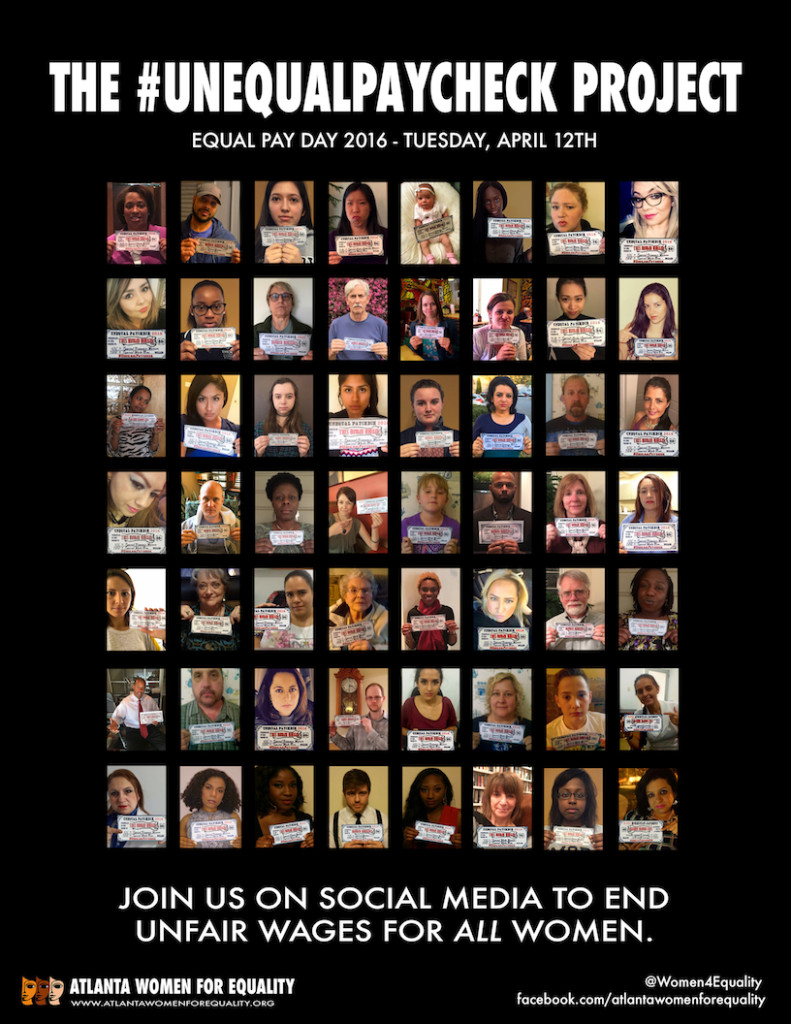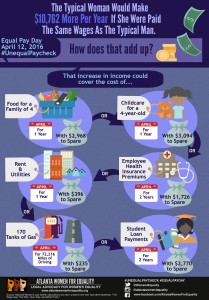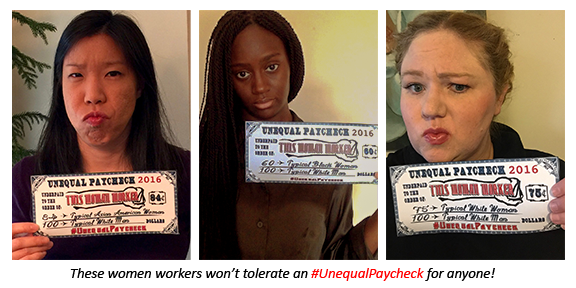 EQUAL PAY DAY 2016
EQUAL PAY DAY 2016
Join the #UnequalPaycheck Social Media Campaign!
Tuesday, April 12th
On average, women working full-time, year-round are paid just 79¢ for every $1 made by men. Thus, in order to receive the same income that the average man earned in the 2015 calendar year, the average woman would have to work an additional 102 days into 2016—until April 12, 2016. For some demographic groups, the disparities are even greater. On average, working full-time, year-round:1
- The typical woman makes only 79¢ for every $1 made by the typical man.
- Asian American women make only 84¢ for every $1 earned by white men.
- White women make only 75¢ for every $1 earned by white men.
- Pacific Islander women make only 62¢ for every $1 earned by white men.
- Black women make only 60¢ for every $1 earned by white men.
- Native American women make only 59¢ for every $1 earned by white men.
- Hispanic women make only 55¢ for every $1 earned by white men.
With the wage gap, a typical woman working full-time in the United States loses $10,762 every year compared with the typical man.2 This is enough money for:
- 83 weeks of food for her family (1.6 years’ worth)3
- Over 7 months of mortgage and utilities payments4
- Over 11 months of rent5
- An additional 4,635 gallons of gas6
On Tuesday, April 12, 2016, join Atlanta Women for Equality (@Women4Equality) and the Fair Pay Coalition,7 a coalition of women’s rights organizations and activists across the country, to raise your voice on Twitter about the wage gap and push for eradication of all unjust pay disparities! Tweet and post your #UnequalPaycheck selfie anytime, and join the #EqualPayDay Twitter storm from 2-3PM! Let’s make change together!
How does it work?
-
Download and take a selfie with our #UnequalPaycheck graphic for your demographic group. Male supporters, we haven’t forgotten you! Please use the “Women Workers” paycheck.
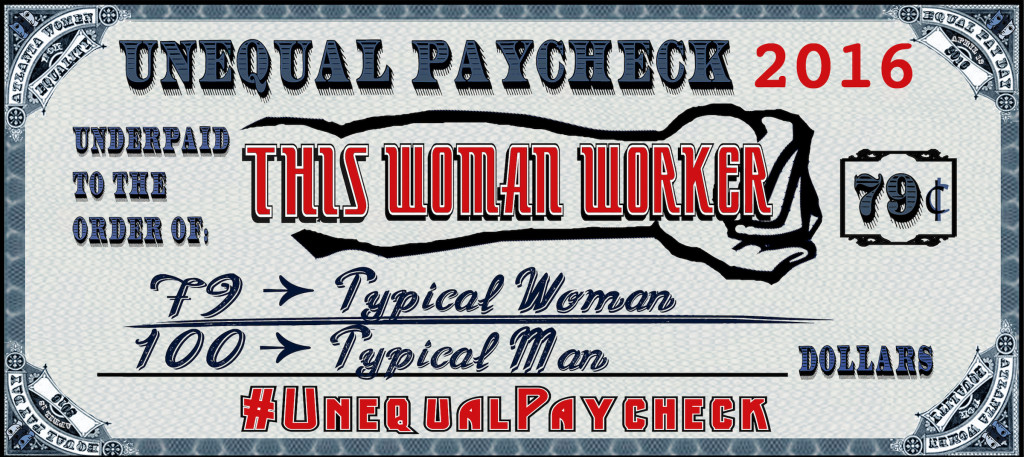
-
Feel free to post your selfie before April 12 on our Facebook event page or email it to info@atlantawomenforequality.org to help us build momentum!
-
Attend our Facebook event, invite your Facebook friends to join us, and help spread the word about the #UnequalPaycheck campaign to everyone you know!

-
Share our event flyer with your friends, and help us raise awareness about the wage gap!
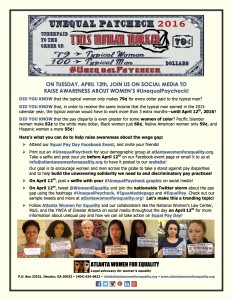
-
On April 12, post your #UnequalPaycheck selfie anytime on Facebook, Twitter, Instagram, or any other social media platform using the hashtags #UnequalPaycheck, #Igualdaddepago, and #EqualPayDay. And, at 2-3PM join the Fair Pay Coalition twitter storm, and let’s make #UnequalPaycheck and #EqualPayDay a trending topic!
Want to do more? Check out these other Equal Pay Day events!
Download #UnequalPaycheck posters and materials to post on Facebook and share with your friends!
Sample Tweets
- Women earn just $0.79 for every dollar paid to men. We need pay equity today! #UnequalPaycheck #EqualPayDay #Igualdaddepago
- Mothers only make $0.73 for every dollar paid to fathers. Families need pay equity today! #UnequalPaycheck #EqualPayDay #Igualdaddepago
- Women lose $10,762 to the wage gap every year, enough to feed their families for 83 weeks. #UnequalPaycheck #EqualPayDay #Igualdaddepago
- The lifetime wage gap is $1,007,080 for Latinas. Women deserve equal pay for equal work! #UnequalPaycheck #EqualPayDay #Igualdaddepago
- Women with a graduate degree still earn $5000 less than a man with a bachelor’s. #UnequalPaycheck #EqualPayDay #Igualdaddepago
- With gender pay equity, global GDP would gain $28 trillion. That’s change we need today! #UnequalPaycheck #EqualPayDay #Igualdaddepago
Learn About: Salary Negotiations
Attend an AAUW salary negotiation workshop!
AAUW’s Start Smart and Work Smart programs are designed to empower women with the skills and confidence to successfully negotiate their salary and benefits packages. By learning strategies and practicing effective language, participants gain valuable skills they can use throughout their lives — well beyond their next negotiation. Find a workshop near you!
In Georgia, Smart Start Workshops are being offered:
- April 14, 2016 at Georgia College & State University
- April 18, 2016 at the University of Georgia
- May 5, 2016 at Georgia College & State University
Learn About: Congressional pay laws
Transparency, minimum wage laws, and paid parental leave would go a long way toward equalizing pay for women. Read about bills that Congress is considering, and get to know your Congresspeople! Find out who represents you here, and click on their profiles to check out their voting records and get their contact information.
Federal minimum wage:
- Would raise the federal minimum wage incrementally every year to $12/hour in four years
- House of Representatives: H.R. 2150
- Senate: S.1150
- A competing Senate bill, S.1832, would raise the federal minimum wage incrementally every year to $15/hour in four years.
Paycheck Fairness Act:
- Would continue the fight against discrimination in the workplace, including expanding Equal Pay Act remedies beyond liquidated damages and back pay, closing employer defense loopholes, and making employer pay practices more transparent to their employee.
- House of Representatives: H.R. 1619
- Senate: S.862
Federal Workers Paid Parental Leave Act
- Would allow federal workers 12 weeks of parental leave time for the birth of a child or an adoption or foster placement, with 6 of those weeks paid
- House of Representatives: H.R. 532
- Senate: S.2033
Learn About: State equal pay laws
Though 48 states (all but Mississippi and South Carolina) have a state equal pay law,
- Only 12 states prohibit discrimination or retaliation for discussing wages;
- Just 20 don’t allow employers to reduce another employee’s pay to comply with equal pay laws;
- A mere 12 states require employers to keep records of employee wages; and
- Only 1 state – Missouri – has a state education program on pay disparity.8
What do you know about your state’s equal pay laws?
How does your state’s minimum wage compare to other states’?
- Check out this helpful state-by-state comparison.
- In Georgia, the state minimum wage is still $5.15. Employees covered under the federal Fair Labor Standards Act (FLSA) are paid the federal minimum wage of $7.25, but those not covered under the FLSA may still be paid the state minimum wage of $5.15!
- Last session, Georgia House members Tyrone Brooks (55th), Dewey McClain (100th), Dee Dawkins-Haigler (91st), Mable Thomas (56th), and Karen Bennett (94th) introduced HB 8 to raise the Georgia minimum wage to $15/hour.
Resources on the wage gap
- EEOC Atlanta District Office‘s resources on equal pay and compensation discrimination, including information on who is covered under the law and time limits on filing a complaint
- The Joint Economic Committee Democratic Staff‘s report Gender Pay Inequality: Consequences for Women, Families and the Economy (April 2016)
- National Women’s Law Center‘s page on Equal Pay and the Wage Gap includes their downloadable fact sheet The Wage Gap: The Who, How, Why, and What To Do (April 2016)
- American Association of University Women‘s Economic Justice page and their report The Simple Truth about the Gender Pay Gap (Spring 2016)
- National Partnership for Women and Families‘ analysis on the gender wage gap and their interactive map with wage gap statistics for every state
- 9to5‘s Equal Pay toolkit includes a fact sheet, a discussion guide, sample letters to the editor, and more
- The Third Way‘s report A Dollar Short: What’s Holding Women Back from Equal Pay? (March 2016)
- Institute of Women’s Policy Research‘s report Pathways to Equity: Narrowing the Wage Gap by Improving Women’s Access to Good Middle-Skill Jobs (March 2016)
- Take Women Employed‘s quiz “What do you know about the gender wage gap?,” and then share it on Facebook and Twitter so your friends and family can find out if they know as much as Lilly Ledbetter, the Notorious RBG, or Jennifer Lawrence when it comes to the fight for equal pay.
- See Chart 5, Women’s to White, non-Hispanic men’s earning ratios and wage gap, by race and Hispanic or Latino ethnicity, U.S. Dep’t of Labor Women’s Bureau, available at http://www.dol.gov/wb/stats/earnings_2014.htm. ↩
- Calculation based on median earnings of all men and women who work full-time, year-round in 2014. America’s Women and the Wage Gap, National Partnership for Women & Families (Sept. 2015), http://www.nationalpartnership.org/research-library/workplace-fairness/fair-pay/americas-women-and-the-wage-gap.pdf. See also Current Population Survey, Annual Social and Economic (ASEC) Supplement, Table PINC-05: Work Experience in 2014 – People 15 Years Old and Over by Total Money Earnings in 2014, Age, Race, Hispanic Origin, and Sex, U.S. Census Bureau, available at http://www.census.gov/hhes/www/cpstables/032015/perinc/pinc05_000.htm. ↩
- Calculation uses overall average “food” cost for the United States. America’s Women and the Wage Gap, National Partnership for Women & Families (Sept. 2015), http://www.nationalpartnership.org/research-library/workplace-fairness/fair-pay/americas-women-and-the-wage-gap.pdf. See also Consumer Expenditure Survey, Table 1800, Region of Residence: Annual expenditure means, shares, standard errors, and coefficient of variation, 2014, Bureau of Labor Statistics, available at http://www.bls.gov/cex/2014/combined/region.pdf. ↩
- America’s Women and the Wage Gap, National Partnership for Women & Families (Sept. 2015), http://www.nationalpartnership.org/research-library/workplace-fairness/fair-pay/americas-women-and-the-wage-gap.pdf. See also American Community Survey 1-Year Estimates 2014, Table GCT2511: Median Monthly Housing Costs for Owner-Occupied Housing Units with a Mortgage – United States – States; and Puerto Rico, U.S. Census Bureau, available at http://factfinder.census.gov/faces/tableservices/jsf/pages/productview.xhtml?pid=ACS_14_1YR_GCT2511.US01PR&prodType=table. ↩
- Calculation uses median gross rent for the United States. America’s Women and the Wage Gap, National Partnership for Women & Families (Sept. 2015), http://www.nationalpartnership.org/research-library/workplace-fairness/fair-pay/americas-women-and-the-wage-gap.pdf. See also American Community Survey 1-Year Estimates 2014, Table GCT2514: Median Monthly Housing Costs for Renter-Occupied Housing Units (Dollars): – United States – States; and Puerto Rico, U.S. Census Bureau, available at http://factfinder.census.gov/faces/tableservices/jsf/pages/productview.xhtml?pid=ACS_14_1YR_GCT2514.US01PR&prodType=table. ↩
- Calculation uses average cost of regular quality gasoline on Sept. 15, 2015. America’s Women and the Wage Gap, National Partnership for Women & Families (Sept. 2015), http://www.nationalpartnership.org/research-library/workplace-fairness/fair-pay/americas-women-and-the-wage-gap.pdf. See also Daily Fuel Gauge Report, AAA, available at http://fuelgaugereport.aaa.com (last visited Sept. 15, 2015). ↩
- The Fair Pay Coalition includes 9to5 National Association of Working Women, American Association of University Women (AAUW), American Civil Liberties Union, American Federation of Labor and Congress of Industrial Organizations (AFL-CIO), American Women, Atlanta Women for Equality, Catalyst, Coalition of Labor Union Women, Equal Rights Advocates, Feminist Majority, Institute for Science and Human Values, Inc., Jewish Women International (JWI), Legal Momentum, MomsRising, National Advocacy Center of the Sisters of the Good Shepherd, National Asian Pacific American Women’s Forum, National Center for Law and Economic Justice, National Council of Jewish Women, National LGBTQ Task Force, National Partnership for Women & Families, National Women’s Law Center, The Leadership Conference on Civil and Human Rights, The Legal Aid Society-Employment Law Center, The Voter Participation Center, Union for Reform Judaism, Women of Reform Judaism, and Women’s Law Project. Thanks also to the YWCA of Greater Atlanta. ↩
- Equal Pay Laws By State, AAUW, available at http://www.aauw.org/files/2016/02/State-Equal-Pay-Chart_Jan-2016.jpg. ↩

